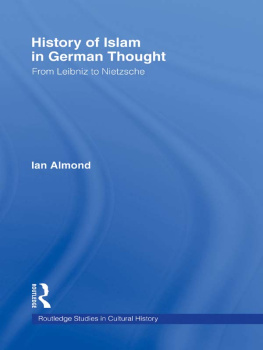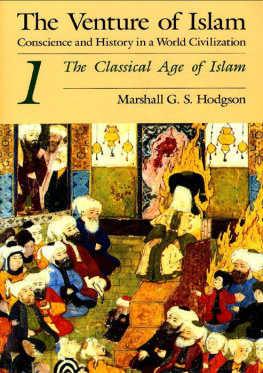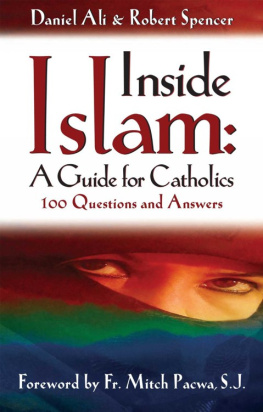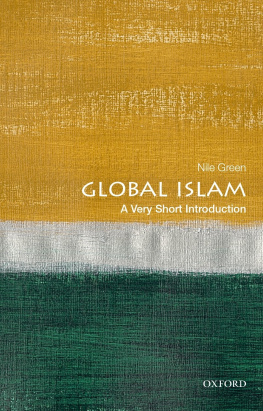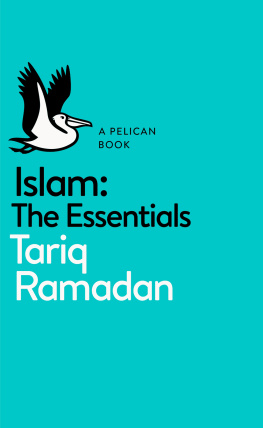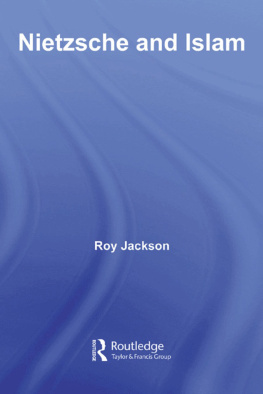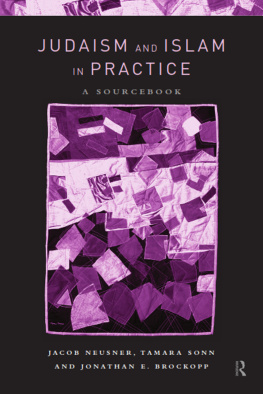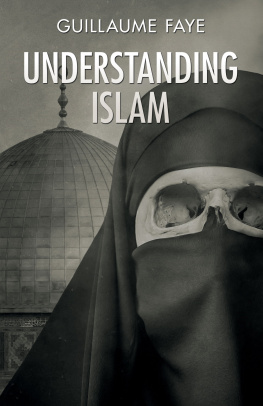Almond - History of Islam in German thought from Leibniz to Nietzsche
Here you can read online Almond - History of Islam in German thought from Leibniz to Nietzsche full text of the book (entire story) in english for free. Download pdf and epub, get meaning, cover and reviews about this ebook. City: New York;Deutschland;Duitsland;Islamitische wereld, year: 2010;2011, publisher: Routledge, genre: Religion. Description of the work, (preface) as well as reviews are available. Best literature library LitArk.com created for fans of good reading and offers a wide selection of genres:
Romance novel
Science fiction
Adventure
Detective
Science
History
Home and family
Prose
Art
Politics
Computer
Non-fiction
Religion
Business
Children
Humor
Choose a favorite category and find really read worthwhile books. Enjoy immersion in the world of imagination, feel the emotions of the characters or learn something new for yourself, make an fascinating discovery.
History of Islam in German thought from Leibniz to Nietzsche: summary, description and annotation
We offer to read an annotation, description, summary or preface (depends on what the author of the book "History of Islam in German thought from Leibniz to Nietzsche" wrote himself). If you haven't found the necessary information about the book — write in the comments, we will try to find it.
History of Islam in German thought from Leibniz to Nietzsche — read online for free the complete book (whole text) full work
Below is the text of the book, divided by pages. System saving the place of the last page read, allows you to conveniently read the book "History of Islam in German thought from Leibniz to Nietzsche" online for free, without having to search again every time where you left off. Put a bookmark, and you can go to the page where you finished reading at any time.
Font size:
Interval:
Bookmark:

- The Politics of Information in Early Modern Europe
Edited by Brendan Dooley and Sabrina Baron - The Insanity of Place/The Place of Insanity
Essays on the History of Psychiatry
Andrew Scull - Film, History, and Cultural Citizenship
Sites of Production
Edited by Tina Mai Chen and David S. Churchill - Genre and Cinema
Ireland and Transnationalism
Edited by Brian Mcllroy - Histories of Postmodernism
Edited by Mark Bevir, Jill Hargis, and Sara Rushing - Africa after Modernism
Transitions in Literature, Media, and Philosophy
Michael Janis - Rethinking Race, Politics, and Poetics
C.L.R. James Critique of Modernity
Brett St Louis - Making British Culture
English Readers and the Scottish Enlightenment, 17401830
David Allan - Empires and Boundaries
Rethinking Race, Class, and Gender in Colonial Settings
Edited by Harald Fischer-Tin and Susanne Gehrmann - Tobacco in Russian History and Culture
From the Seventeenth Century to the Present
Edited by Matthew P. Romaniello and Tricia Starks - History of Islam in German Thought
From Leibniz to Nietzsche
Ian Almond

First published 2010
by Routledge
270 Madison Ave, New York, NY 10016
Simultaneously published in the UK
by Routledge
2 Park Square, Milton Park, Abingdon, Oxon OX14 4RN
Routledge is an imprint of the Taylor & Francis Group, an informa business
This edition published in the Taylor & Francis e-Library, 2009.
To purchase your own copy of this or any of Taylor & Francis or Routledges collection of thousands of eBooks please go to www.eBookstore.tandf.co.uk.
2010 Taylor & Francis
All rights reserved. No part of this book may be reprinted or reproduced or utilised in any form or by any electronic, mechanical, or other means, now known or hereafter invented, including photocopying and recording, or in any information storage or retrieval system, without permission in writing from the publishers.
Trademark Notice: Product or corporate names may be trademarks or registered trademarks, and are used only for identification and explanation without intent to infringe.
Library of Congress Cataloging-in-Publication Data
Almond, Ian, 1969
History of Islam in German thought from Leibniz to Nietzsche / Ian Almond.
p. cm. (Routledge studies in cultural history ; 11)
Includes bibliographical references and index.
1. Philosophy, German. 2. Islam. I. Title.
B2528.I85A46 2010
297.0943dc22
2009016938
ISBN 0-203-86728-9 Master e-book ISBN
ISBN10: 0-415-99519-1 (hbk)
ISBN10: 0-203-86728-9 (ebk)
ISBN13: 978-0-415-99519-1 (hbk)
ISBN13: 978-0-203-86728-0 (ebk)
A number of people have helped in the reading and commenting of various drafts, as well as providing me with difficult to find copies of their materialsspecial thank-yous to:
Uygar Abaci, Gil Anidjar, Robert Bernasconi, Jane K. Brown, Sun Demirel, David Latan, Randy Malamud, Mark Neocleous, Lee Anne Richardson, Margaret Russett, Wilhelm Schmidt-Biggemann, Reiner Smolinski and Calvin Thomas.
Certain chapters in this book appeared, in slightly revised versions, in a number of journals:
Chapter 1 in Eighteenth Century Studies 39, no. 4 (2006); Chapter 3 in PMLA 123, no. 1 (January 2008); Chapter 8 first appeared in German Life and Letters 56, no. 1 (2003), and then in a revised form in my own book The New Orientalists: Postmodern Representations of Islam from Baudrillard to Foucault (I. B. Tauris, 2007).
The book in your hands is nothing more, nor less, than a history of the reception of the Muslim world in the works of eight key German thinkers. It begins with Leibnizs plan to invade Egypt (1671) and ends, a couple of hundred years later, with Nietzsches praise of Islam in The Antichrist (1888). Although one of the points of a preface is to explain why the author took the path he did, and not to speculate on paths not chosen, I should confess at the outset that this is not quite the book I had started out to write.
My original plan, some eight years ago now, had been to write a history of the demonization of Islam in mainstream German thoughtand how the threatening space of non-Europe was used to cement and solidify the pristine, rational, free topos of Europe. Provoked by the genius of Edward Saids multiple critiques of European hegemony (Orientalism, Culture and Imperialism), my intention was to move from thinker to thinker, and from epoch to epoch, carefully delineating the various stages in which Islam was reduced from Fiend to Footnote.
Very early on, however, two problems presented themselves. They were not insurmountable obstacles, but rather nagging doubts, persistent quibbles, which began to force the restructuring and rethinking of the whole project. The first concerned the truly bewildering variety of responses in one thinker to the faith and cultures of Islam, responses which were so zigzagging and contradictory in nature that I was forced to rethink not merely the book, but my entire concept of what an author is. Whether it was a historian such as Herder, who could call Arabs a savage people one year and praise them as sublime poets the next, or a philosopher such as Marx, who could show genuine compassion for Algerians as victims of colonialism in one letter and (five days later) depict them as backward buffoons in another, it seemed clear any conventional notion of the author as a stable, autonomous entity was inadequate for the project. A keener, more sensitive awareness of the process of compartmentalization was necessary if the simultaneity of differing beliefs in the same thinker was to be addressed effectively. Instead of seeing thinkers as collections of reasonably coherent, gradually self-modifying beliefs and opinions, located around a consistent nexus or self, a very different understanding of the author came into beingthe writer (be it philosopher, historian or poet) as a kind of space, in which different sub-identities and vocabularies (religious, political, professional) collided with one another and struggled to take control. No longer a static notion of the author as a repository of stable beliefs, then, but rather a more volatile idea of the writer as a constantly swirling flux of different forcesa flux, admittedly, with rhythms and patterns, but nevertheless a far more unpredictable entity than the orderly display cabinets some histories of ideas present us with. In some cases, as we shall see, these forces were capable of pulling a given writer in completely different directions. Insofar as I have tried to delineate these movements of friction and collisionand essentially map out the circulation of empathy and antipathy in these eight subjectsthis history of Islam in German thought might also be called an anatomy of prejudice.
A second problem emerged in reading the eighteenth/nineteenth-century Orientalist sources thinkers such as Kant and Goethe employed. This part of the project had originally been intended to show where Kants fanatical Arabs and Hegels uncultured Turks came fromin other words, how an Orientalist tradition of defamation and misrepresentation concerning the Muslim world presented these thinkers with a skewed and demonized facade. Two points, however, quickly complicated this approach. The first was the significant number of scholars and historians in the German tradition (Reiske, von Diez, von Mller) who were both presciently aware of the dangers of interpreting other cultures, and were attempting to present a more sophisticated picture of the Muslim world. The extraordinary warning against cultural projection, given by the Leipzig Orientalist Jacob Reiske in 1757, is indicative: What would we say to a Mohammedan, who without knowing our theology in its widest range, made a translation of the New Testament and poured his philosophical sludge all over it? Figures such as Heinrich von Diez (one of Goethes most significant sources), who dedicated their energies to correcting European images of the Turk with volume after volume of translated Turkish writings, appeared to complicate the standard (post-Said) notion of the blindly Eurocentric Orientalist. The second point was not simply the existence of these Orientalists, but the extent to which writers such as Goethe or Hegel, while aware of the information they delivered, persistently chose to ignore it in their own treatment of Turks or Islam. Goethe was intimately familiar with anthologies of Ottoman poetry and thought, and yet could still portray Turks as bloodthirsty beasts; the newspaper Hegel edited for a year was filled with reports from the Ottoman world, and yet for Hegel Islam continued to be a faith which had disappeared from history; in the case of Schlegel, a life spent learning Persian and Arabic, absorbing countless books on Arabs and Muslim culture, did not prevent him from ultimately seeing the Muslim world as a Satanic phenomenon. Rather than seeing a prejudiced and biased Orientalist tradition which poisoned the innocent curiosity of the literary and intellectual mainstream with its own store of images and clichs, what was emerging in my research was a continual process of filteringwhereby German intellectual elites sifted through a variety of Orientalia, taking the nuggets they needed but either overlooking or consciously rejecting anything which conflicted with their requirements. To some extent, the multiple selves of German authors appears to have gone hand in hand (as a cause or a consequence I have yet to decide) with this archival filtering of the Muslim Orient.
Font size:
Interval:
Bookmark:
Similar books «History of Islam in German thought from Leibniz to Nietzsche»
Look at similar books to History of Islam in German thought from Leibniz to Nietzsche. We have selected literature similar in name and meaning in the hope of providing readers with more options to find new, interesting, not yet read works.
Discussion, reviews of the book History of Islam in German thought from Leibniz to Nietzsche and just readers' own opinions. Leave your comments, write what you think about the work, its meaning or the main characters. Specify what exactly you liked and what you didn't like, and why you think so.

